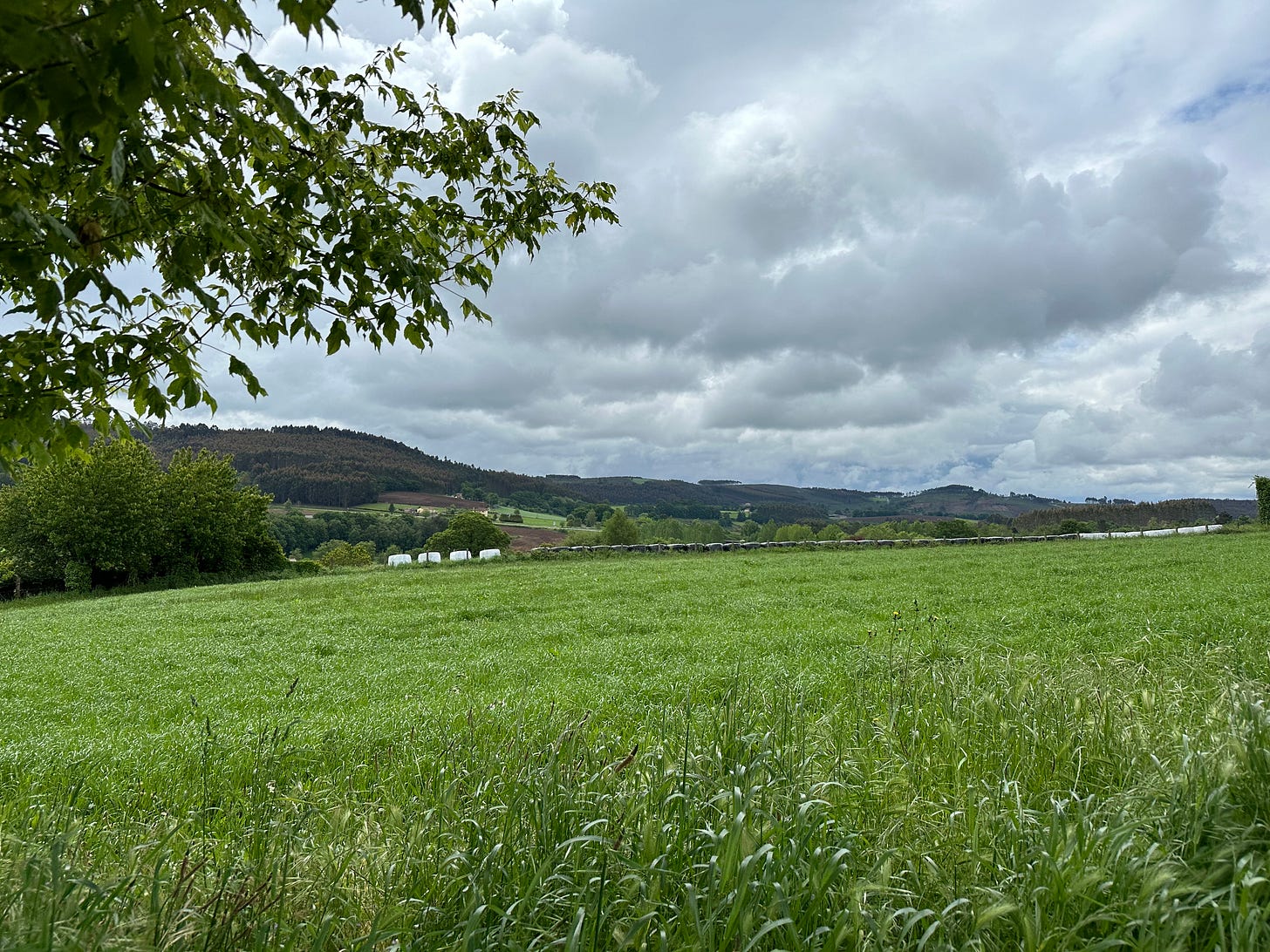Lessons learned from 6 internet-free days backpacking alone
I walked the final ~120km of El Camino de Santiago recently and here's what I learned
I first read about El Camino years ago in a novel and decided it would be cool to go at some point. This year, I finally decided to embark on the journey and chose to walk the final ~120km of the Camino Francés (the French route). I didn’t have any specific goals for myself other than: (1) survival, and (2) trying to stay offline.

Excitingly, I was able to meet both of those goals and here are the lessons that stuck, in no particular order:
When there is a task that feels insurmountable or extremely daunting, the only way to get started is to put one foot in front of the other and move forward, even if it’s at a snail’s pace (importantly, after making sure I’m headed in the right direction)
When I’m alone, my negative emotions evaporate a lot faster than when there is someone to discuss with and vent to; frustration or annoyance disappeared when I realized nothing was changing about my reality and I needed to just keep going
When I am clear about what I want and I set my mind to it, the universe is good to me in making this possible. I really wanted company for the third day after feeling lonely on the second day. Lo and behold, at the perfect time at the perfect spot, I encountered someone who walked at just my pace and was excited to chat
Hope and humility go a long way – whether framed religiously or not. This was a big topic of discussion between me and my aforementioned walking companion (who was very Catholic). Hope can come from religion or a blind-faith-like confidence in the universe or whatever other source one may look to. And in order for that hope to be maximally powerful, humility is also a necessary part of the equation. Humility can take the form of understanding one’s own fallacies or the limits to one’s abilities and responsibilities, or…much much more that I won’t get into here
Being online and connected makes me feel lonelier by exposing me to: (1) the possibility of contact with others and (2) fomo. Having access to any information I desire is apparently a huge burden; when I didn’t have internet, I chose where to eat by walking up and down each street and making a decision based on what I saw without knowing any ratings or reviews. And the best part was not knowing what I was missing out on – perhaps there were other spots on other streets, but I’d never know
Simplification and slowing down is an art form. Examples of moments where I really felt this: Brushing my hair with a tiny comb, one small strand at a time (light packing meant foregoing my regular hairbrush), hand washing my socks and cleaning my shoes every night, and spending lots of time handwriting my reflections
Here are some questions and thoughts that crossed my mind during the walking:
What is the difference between being alone and being surrounded by people but no one to talk to?
In an apocalypse, walking would be a horrible way to escape because of how inefficient it is
Maybe people who are brave were brave because they had no one else to be scared to; when I’m alone, it certainly feels this way (I am brave but not because I have a choice)
On El Camino, the early bird catches the laundry machine
When it was sunny, I felt the soreness in my shoulders from carrying my backpack. When it became rainy, I fixated on the rain. When the path became muddy and slippery, I had no mental space to think about anything but not falling down. Apparently, I had space in my brain to focus on one challenge at a time and it was easy to displace smaller challenges in light of bigger ones
The best opening line for me to meet other people on El Camino was simply to ask, “Where are you from?”
Unsurprisingly, along the way, I also thought a lot about faith and religion. Inherently intertwined with this was also my constant awareness of whether I felt like I belonged and I was part of a community.
I was very pleased to find that being on this pilgrimage – despite coming from my own non-religious background – almost immediately came with a sense of belonging and community. It was so easy to identify the other pilgrims along the route even though everyone had a slightly different way of dressing and bringing their belongings with them. The universal greeting on the path was “Buen camino!” no matter what language someone spoke, and there was something very magical about that.
It is pretty rare to find such a varied group brought together by a common activity and goal these days, particularly if you’re not religious. I thought this was truly fascinating and am curious to see what other venues can provide a similar sense of belonging and community so instantaneously.
Jump into the comments section if you’ve found other venues that provide this sort of belonging, or if you’ve done the Camino / are considering it!

totally agree with the "only way through, is through" sentiment, and that larger challenges displace smaller ones (so completely, you wonder why you were so fixated on the smaller ones). I wonder if there's some sort of exposure therapy we could arrange so that folks experience larger challenges...assuming they keep perspective when smaller challenges come along later, that could be quite useful!
not everyone should face serious cancer & repeated chemo kinds of challenge, but is there something we could provide to build lasting perspective?
Such a neat read. Can I ask what motivated you to start the journey?